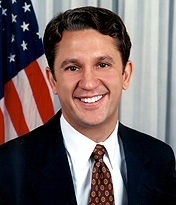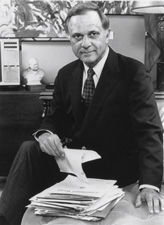
David Hampton Pryor is an American politician and former Democratic United States Representative and United States Senator from the State of Arkansas. Pryor also served as 39th Governor of Arkansas from 1975 to 1979 and was a member of the Arkansas House of Representatives from 1960 to 1966. He served as the interim chairman of the Arkansas Democratic Party, following Bill Gwatney's assassination.
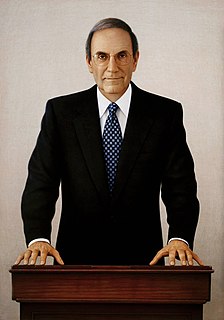
The 1992 United States Senate elections, held November 3, 1992, were elections for the United States Senate that coincided with Bill Clinton's victory the presidential election. Despite the presidential victory, Democrats had a net loss of a seat in the general elections, and only managed to break even by winning a seat in a special election.

The 2006 South Carolina State Elections took place on November 7, 2006, and included the gubernatorial election. All nine popularly elected constitutional officers were up for reelection, and all races except the Attorney General's were contested. The entire South Carolina House of Representatives, one state senator and six state circuit solicitors were also up for election. Several constitutional amendments were also on the ballot.

Arkansas's 2006 state elections were held November 7, 2006. Primaries were held May 23 and runoffs, if necessary, were held June 13. Arkansas elected seven constitutional officers, 17 of 35 state senate seats, all 100 house seats and 28 district prosecuting attorneys, and voted on one constitutional amendment and one referred question. Non-partisan judicial elections were held the same day as the party primaries for four Supreme Court justices, four appeals circuit court judges, and eight district court judges.

Morris Sheppard Arnold, sometimes known as Buzz Arnold, is a judge on the United States Court of Appeals for the Eighth Circuit. A Republican, he was appointed to the appeals court by U.S. President George Herbert Walker Bush. His tenure began on June 1, 1992. For his first 12 years, until 2004, he served on the court alongside his older brother, Richard S. Arnold, a Democrat appointed by President Jimmy Carter. He served as judge on the United States Foreign Intelligence Surveillance Court of Review from 2008 to 2013.

The Arkansas gubernatorial election of 1980 was only that state's third election since Reconstruction when a Republican candidate won the governorship, and the first in which an incumbent was defeated.

The Arkansas gubernatorial election of 1978, held on November 7, was the first time that Bill Clinton was elected Governor of Arkansas.
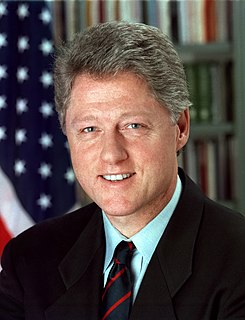
Electoral history of Bill Clinton, 42nd President of the United States (1993–2001); 40th and 42nd Governor of Arkansas.

Electoral history of Mike Huckabee, Republican politician and 44th Governor of Arkansas.

Edward Sheffield Nelson, known as Sheffield Nelson, is an American attorney, businessman and politician from the capital city of Little Rock, Arkansas. Originally a Democrat, Nelson in 1990 ran for governor of Arkansas as a Republican against then governor and future U.S. President Bill Clinton and in 1994 against another Democrat, the incumbent Governor Jim Guy Tucker.

Arkansas gubernatorial election, 1994 took place on November 8, 1994, as a part of the United States gubernatorial elections, 1994.
Kim Dexter Hendren is a Republican currently serving in the Arkansas House of Representatives. He is a former member of the Arkansas State Senate who served as Minority Leader and chairman of the Energy Committee. Term-limited, he left the Senate in January 2013.

Aylmer Lynn Lowe, known as A. Lynn Lowe, was an American farmer and politician from Garland near Texarkana in Miller County in southwestern Arkansas, who was a major figure in the Arkansas Republican Party. He was the Republican gubernatorial nominee in 1978 against the Democrat Bill Clinton, served as state party chairman from 1974 to 1980, and was the GOP candidate in Arkansas's 4th congressional district in 1966, having been defeated by the Democrat David Pryor, then a state representative and a future governor and U.S. Senator, originally from Camden in Ouachita County in south Arkansas.

The 1992 United States elections elected state governors, the national president, and members of the 103rd United States Congress. The election took place after the redistricting that resulted from the 1990 Census. Democrats won control of the presidency and both chambers of Congress for the first time since the Republican victory in the 1980 elections.

The North Carolina gubernatorial election of 1984 was held on November 6, 1984. Democratic incumbent Jim Hunt was unable to run for another consecutive term under the North Carolina Constitution. Hunt ran instead for the U.S. Senate against Jesse Helms and lost. Popular 9th District Congressman James G. Martin ran as the Republican nominee against Democratic Attorney General Rufus L. Edmisten, who defeated Hunt's Lt. Governor, James Green, among other candidates, in a hotly contested primary.

The 1992 United States presidential election in Hawaii took place on November 3, 1992, as part of the 1992 United States presidential election. Voters chose four representatives, or electors to the Electoral College, who voted for president and vice president.

The Arkansas gubernatorial election of 1986 was conducted on November 4, 1986, to elect the Governor of Arkansas.

The 1942 Arizona gubernatorial election took place on November 3, 1942. Incumbent Governor Sidney Preston Osborn ran for reelection, and easily defeated a challenge from former Governor Robert Taylor Jones in the Democratic primary, who Osborn also defeated in 1940.

The 1944 Arizona gubernatorial election took place on November 7, 1944. Incumbent Governor Sidney Preston Osborn ran for reelection, and easily won the Democratic primary, with only token opposition as former Governor Robert Taylor Jones declined to challenge Osborn to a rematch following two losses, in 1940 and 1942.
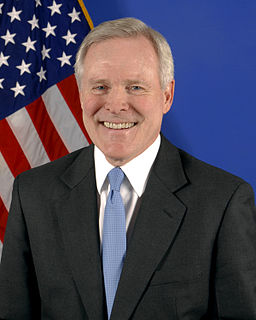
The 1987 Mississippi gubernatorial election took place on November 3, 1987, in order to elect the Governor of Mississippi. Incumbent Democrat William Allain was term-limited, and could not run for reelection to a second term.








